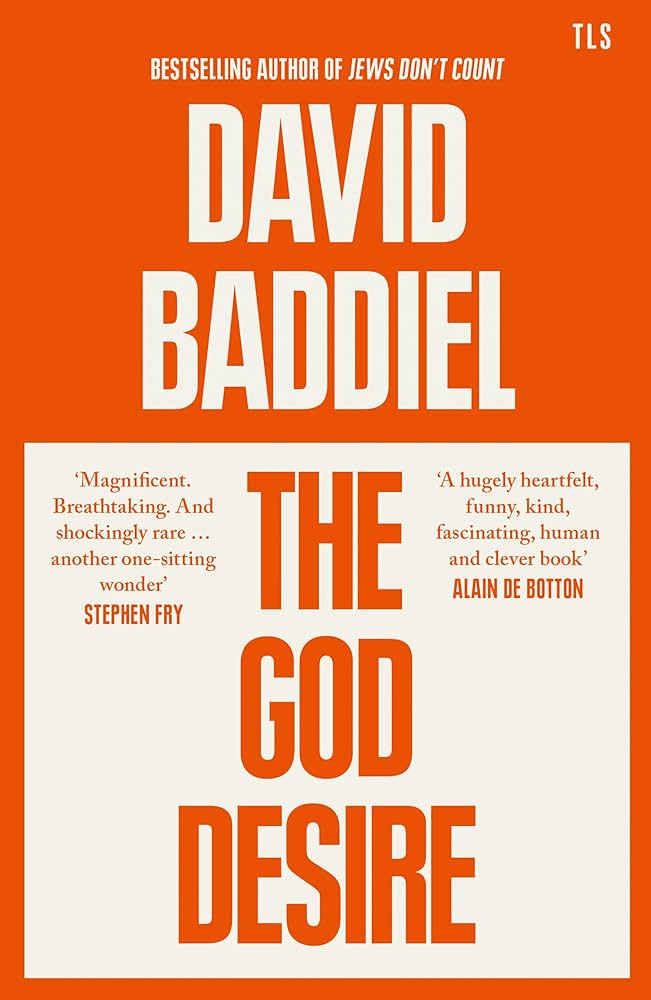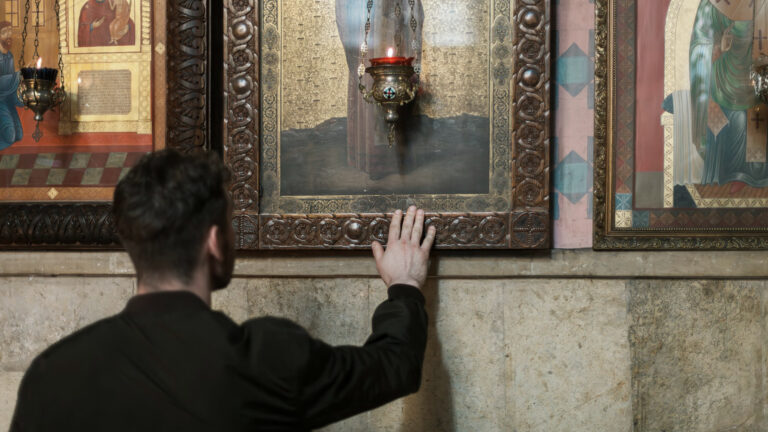David Baddiel’s punchy little book The God Desire is an apologetic for atheism—not the kind of unbelief that disrespects religion and its benefits (Baddiel is Jewish), but still, a naturalist’s take on the world that says we’re better off dispensing with fantasies intended to shield us from death.
“I desperately want to believe in God,” he writes. “That’s why I know He doesn’t exist.” This is, in a way, the inverse of the argument we find in writers such as C. S. Lewis, who contended that the human longing for something beyond the material world suggests the existence of a transcendent reality that fulfills these innate desires. The experience of hunger indicates the reality of food.
Baddiel acknowledges his desire for God but leans on this experience to arrive at the opposite conclusion:
Human beings can desire things they don’t have but that existentially exist. . . . The God Desire is an urge for something to exist for which there is no existential proof, and that no one has, in concrete terms, experienced. (20)
In other words, desire doesn’t provide the frame for reality. “The God Desire should not have to lead to the God Delusion,” he says (8). Your desire for water in the desert, after all, is what leads you to fall for a mirage.

The God Desire
David Baddiel
David Baddiel would love there to be a God. He has spent a lot of time fantasising about how much better life would be if there actually was such a thing as a Superhero Dad who chased off Death. Unfortunately for him, there isn’t. Or at least, that is Baddiel’s view in this book, which argues that it is indeed the very intensity of his, and everyone else’s, desire for God to exist that proves His non-existence. Anything so deeply wished-for we will, considers Baddiel, make real. The admission of his own divine yearnings makes for a book that is more vulnerable – and more understanding of the value and power of religion – than most atheist polemics. A philosophical essay that utilises Baddiel’s trademarks of comedy, storytelling and personal asides, The God Desire offers a highly readable new perspective on the most ancient of debates.
Shield from Death
So why is the desire for God so widespread, Baddiel wonders. Why is it so strong?
We could point to what a divine being provides for human psychology. God offers story. “He storifies life,” Baddiel writes. And with story comes meaning—“a sense on an individual level, that your own narrative has significance: that it matters in some way” (9).
But these benefits flow downstream from the real reason the God desire is so strong: we’re scared to death of death. As we shrink back from death, we reach out to God as “an archetype, a super-projection, of a parent who can be both blissful and terrifying.” All the other psychological benefits are “spin-offs” from this primary reason. “Oblivion is the issue. Nothingness is the issue” (11). And Baddiel admits nothing freaks him out more than the thought of no longer existing—the extinguishing and annihilation of his life.
I believe that humans cannot bear to look directly at the face of death, and so have invented the face of God as a shield. (12)
People are swayed by religious faith because of their fear of death. He mentions the Jewish funeral service that speaks of God swallowing up death, making it “disappear in the most visceral way, like a parent sucking a poisonous bite from a child’s arm.” He admires the idea that God would swallow up death forever even as he assumes this description of God’s power implies “the fragility of the belief underneath”—that perhaps death could reemerge to taunt us again (44). Christianity is effective because the story of Jesus is the “Greatest Story Ever Told”—a tale that “hits a lot of the correct commercial storytelling beats” (69).
In the end, though, we’re better off dealing with the bleakness of our future decay in the aftermath of death. We should plant our flag on this naturalist terrain. Believers find comfort in the idea of God, but does anyone really believe? When asked about atheists who are said to have recanted on their deathbeds, Baddiel shrugs: “It’s just a scream in the dark” (56). Religious or not, we’re all terrified of death, and so we cope in one way or another.
Wonder and Morality
What about religion’s other benefits—the beauty of the world, the moral frame of good and evil, or a sense of wonder at the mysteries of the world? Baddiel believes wonder is a distraction from a better path—being “obsessed only with truth.” Wonder is, like God, merely a projection, something we use to fill in the gaps when we lack understanding (51).
The more we progress in knowledge, the fewer mysteries remain. We’ll eventually understand even something as strange as dark matter, including its cause. In any case, “the fact that we don’t know stuff doesn’t mean that the stuff we don’t know is God” (48), he says.
Here, Baddiel’s line of thinking resembles that of the 19th-century French philosopher Auguste Comte who imagined the story of human ascent in various stages:
- In the first stage, people attributed mysterious events to the gods.
- The second stage was metaphysical, with abstract entities replacing the gods.
- The third stage is interpreting the outworking of nature in terms of natural laws.
As you can see, at each stage of human development, a supernatural explanation for something was replaced with something else. There used to be a “God gap,” but as those gaps continue to shrink, we’re right to hold out for a purely naturalist explanation for whatever we find mysterious.
Baddiel realizes the nonexistence of God undermines the basis for morality in our world. He doesn’t deny the societal implications of naturalism. He’d agree with Yuval Noah Harari and others who admit there’s no metaphysical grounding for an idea like “human rights.” Such a notion exists only in the fertile imagination of human beings. It’s an invention. Human rights are neither self-evident nor endowed by any transcendent Creator.
Yes, the denial of a transcendent source for morality might lead to moral collapse, Baddiel says, yet he takes pride in insisting on the truth anyway. Severe as the consequences may be, the truth is still the truth, whether we can handle it or not.
“Basically we’re all going to die and there’s no point to life and yes, The End,” Baddiel says. “I am bound to the truth. And the truth hurts. We can’t handle the truth” (86). All we can do is “laugh at our own futility,” to laugh in the face of our eventual nothingness, knowing that “the living are just the dead on holiday” (88).
‘You Can’t Handle the Truth’
David Baddiel is a terrific writer, with a penchant for smooth turns of phrases and a chatty, breezy style. He makes his case with panache and verve, never taking himself too seriously, perhaps partly because there’s no point in taking anything too seriously (with the world’s inevitable demise and everything).
And yet I see nearly every point of evidence Baddiel offers for his atheism as a reason for God.
- The nearly universal desire for God is merely an attempt to evade the horror of death, he says. But what if the nearly universal desire to evade death is an indication we were made for eternal life?
- We’ve invented God to shield us from the face of death, he says. But what if the modern world has invented atheism to shield us from the face of God?
- Our thirst leads us to fall for a mirage under the illusion that water is there, he says. But what if our thirst is so powerful that we can be fooled by a mirage when there really is a flowing stream somewhere?
- What was mysterious in the past has now been explained by science, he says. But what about all the new questions that every discovery elicits? How, the more we know, the more wondrous and intricate we see the world to be?
- Christianity is compelling because it’s just a great story, he says. But what if the story is compelling because it’s true, and what if we find it great because this is the truth we were made for?
- It’s best to come to terms with our mortality and laugh at the futility of life, he says. But how much better to laugh in the face of death, to taunt a defeated foe who has lost its sting?
David Baddiel’s The God Desire is a good-natured expression of what, as Charles Taylor pointed out, has become an axiom today: religious belief is childish, and the truly courageous will stare into the abyss of nothingness. “We can’t handle the truth!” But what if an obsession with truth, no matter the consequences, leads not to opposition to wonder but to wonder as its ultimate end? What if wonder isn’t a projection but a Person?
In a secular age, perhaps the greater courage comes not from the naturalist determined to stare down death but from the believer who peers into an empty tomb in Jerusalem and shivers at the incredible implications.
If you would like my future articles sent to your email, as well as a curated list of books, podcasts, and helpful links I find online, enter your address.

















